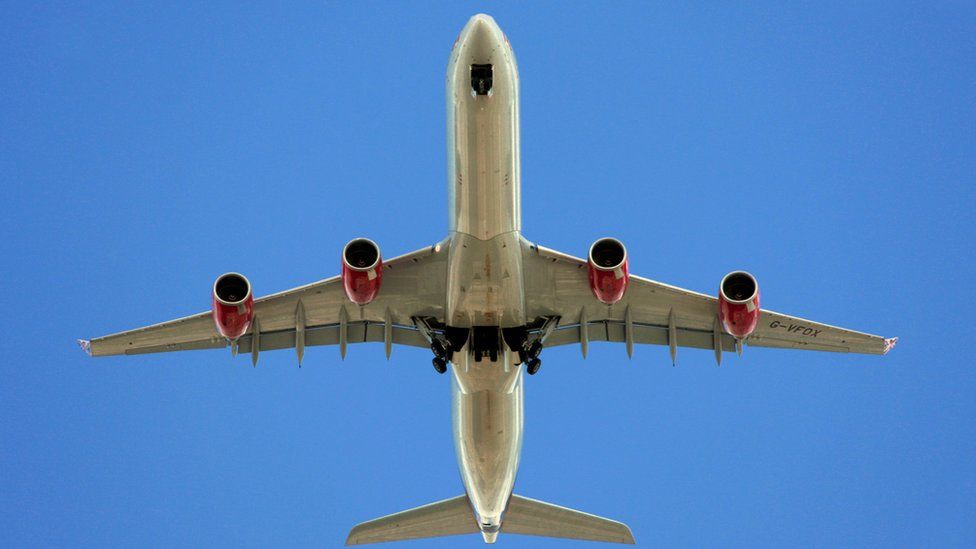Airport expansion: New runways for Heathrow and Gatwick?
- Published

After years of discussion and delay, the government is due to decide this week whether to build a new runway at Heathrow Airport, or at Gatwick.
But given that Heathrow is already operating at maximum capacity, and its rival is expected to run out of space within the next few years, why does it have to be one option or another?
Put simply, why hasn't the option of building an additional runway at both Gatwick and Heathrow been seriously considered?
Environmental constraints, public opposition and economic arguments all come into it, but the simple answer appears to be: politics
Two runways better?
There are certainly strong arguments in favour of building two runways.
The independent Airports Commission, which issued its final report last year, pointed out that London's airport system would be using 90 percent of available capacity by 2030.
Even under relatively pessimistic forecasts, it said, by 2040 all London airports would be full, with the exception of Stansted.
Although it recommended building just one new runway in the immediate future, it added that "there is likely to be a demand case for a second additional runway to be in operation by 2050, or in some scenarios, earlier".
Peter Morris, chief economist at the aviation consultancy Ascend, thinks it would make business sense to build two new runways, because the extra capacity will certainly be needed.
He believes that because Heathrow is focused on business traffic and long haul services, while Gatwick caters for more short haul, leisure services, both should be allowed to expand.
"It would be better to have two capacity options", he says, "because no-one really knows which way the industry is going to go, or where the most growth will be".
The GTMC, which represents business travel firms, is also firmly in favour of expanding both airports.
"Each airport has a different international network and importantly connects to different regions of the UK, both of which are essential to sustained economic growth", says chief executive Paul Waite.
Analysts say that although some airlines have a clear preference for expansion at Heathrow, many would welcome a second runway at Gatwick as well. They believe it would boost competition between the two, leading to lower charges and better facilities.
Ryanair's chief executive, Michael O'Leary, has gone further. He recently called for new runways to be built at Heathrow, Gatwick - and Stansted as well.
Why Theo wrote this article
We asked readers to send BBC Business correspondent Theo Leggett their questions on airport expansion.
Theo chose four questions, and we asked you to select your favourite, which came from Bob White.
He asked: "Why hasn't the option of building an additional runway at both Gatwick and Heathrow been considered?"
Bob explained to us the thinking behind his question:
"I would use the M25 analogy... by the time it was completed the motorway already required expanding. So why not be bold and show the world we are really serious about being an outward looking, trading nation and build UK airport capacity for the real long term future?"
The downside
Yet there are also powerful arguments for limiting expansion. In environmental terms, for example, it could cause serious problems.
The Climate Change Act introduced strict, legally binding targets for reducing emissions of carbon dioxide in the UK.
To help achieve those targets, the government's Commission on Climate Change says that emissions from aviation should be no higher by 2050 than they were in 2005.
This matters a lot. Carrying a single passenger from London to New York and back generates roughly the same amount of CO2 as an average family in Europe heating their home for a year.
So although aviation currently accounts for only about 7% of the UK's overall emissions, that figure could grow rapidly as passenger numbers increase.
Airportwatch, a campaign group representing environmental lobbies and community groups opposed to airport expansion, thinks that if a new runway were built it would be "very difficult" for the country to meet its targets.
It follows that a second extra runway, which would permit even more flights, would simply make matters worse.
Political hot potato
It is also worth looking at the level of opposition to airport expansion, which takes in people living near to both airports or under their flightpaths, environmental activists, and even members of the Cabinet.
Let's not forget that back in 2009, the then-prime minister Gordon Brown did give the go-ahead to a 3rd runway at Heathrow. That decision was later overturned by his successor, David Cameron - who subsequently appointed the Airports Commission to look again at the issue.
Since then there have been further delays. Even if a decision is taken this week, the government is likely to face a number of legal challenges. Greenpeace, for example, has already teamed up with a number of London councils to oppose the possible expansion of Heathrow.
It is, to say the least, a political hot potato, and will probably remain that way for the foreseeable future. No full length runway has been built in the South East since the 1940s - and arguments have been raging about how and where to create new capacity for decades.
In that context, getting one new runway in place still looks like a formidable challenge. Trying to build two, in the current political climate, looks all but impossible.
Take a look at some of the other questions you have wanted us to answer: